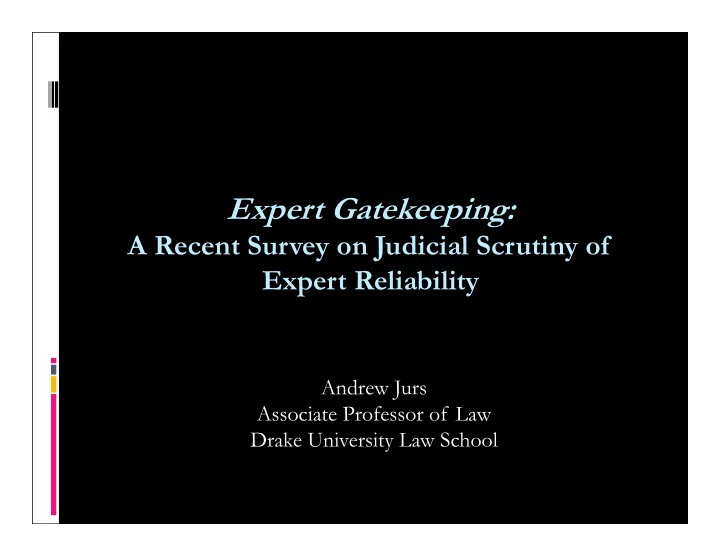

Expert Gatekeeping: A Recent Survey on Judicial Scrutiny of Expert Reliability Andrew Jurs Associate Professor of Law Drake University Law School
Overall Research Plan: Earliest Commentary on Daubert : Epidemiological Evidence as an example of problems Prior Efforts by Reformers to Manage Science in Court Comparative Assessment of Experts (Canada, UK, etc) Empirical Analysis of Daubert Issues : Survey Work : #1: NE/IA/ND: judicial questions/independent experts #2: *6 states*: procedural & substantive gatekeeping issues #3: [planned]: prevalence and perception of experts Large-Data Analysis: #1: Daubert and Civil Defendants #2: Daubert and Civil Plaintiffs
Gatekeeping: Survey of Judges Questions: How often do judges see/grant motions on expert reliability? What procedural methods do they use? What substantive factors likely to use? How comfortable are they handling the motion? Planning the Survey : 1. What judges should be involved? 2. What states should be involved? 3. What do I need to ask?
Gatekeeping: Survey of Judges #1: Selection of Judges: District Court judges, at highest trial level in their state #2: States : 2 issues: region & admissibility standard West : Arizona (F) and New Mexico (D) Midwest : Minnesota (F) and Michigan (D) South : Alabama (F) and Mississippi (D) TOTAL : 996 eligible judges
Gatekeeping: Survey of Judges #3: What questions to ask? : 1) Expert Reliability Motions (in General) EX: frequency, ways to decide, comfort level 2) Expert Reliability Motions (when Granted) EX: extent of limit, reasons therefore, comfort level 3) Summary Judgment Motions (for Comparison) EX: same Q’s as for Reliability TOTAL RESPONSES: 158
Overall Results: Reliability Motions Frequency of Expert Reliability Motions: “In what % of cases with experts do you see a motion challenging the reliability of expert testimony?”
Overall Results: Reliability Motions Substantive Factors to Decide Reliability Motions “In determining the reliability of expert testimony, I believe the following substantive factors are helpful:” Number Who Believe the Percentage Factor is Helpful Technique Can And Has Been Tested 143 90.5 Subjected To Peer Review And Publication 139 87.8 Known Or Potential Rate Of Error 111 70.2 Existence Of Standards Controlling The Technique 128 81.0 General Acceptance 152 96.2 Other 5.1 8 Total = 158
Overall Results: Reliability Motions Procedural Methods to Decide Reliability Motions: (of those judges who have ruled on a reliability motion) “In deciding the reliability of expert testimony, I used the following techniques to make a ruling:” Number Who Have Percentage Used the Technique Hearing With Testimony Presented 101 85.6 Hearing Without Testimony Presented 63 53.4 Questioning a Witness From the Bench 64 54.2 Independent Expert 7.6 9 Special Master 3.4 4 Other 8.4 10 Total = 118
Overall Results: Reliability Motions Frequency of Granting Expert Reliability Motions: (of those judges who have ruled on a reliability motion) “How many times have you limited expert testimony due to a reliability motion?”
Overall Results: Reliability Motions Comfort Level w/Reliability Motions: (all judges) “How comfortable are you evaluating a motion that challenges the reliability of expert evidence?” 1 = “Entirely Comfortable”; 7 = “Not Comfortable”
Overall Results: Reliability Motions Comfort Level for Granting Reliability Motions: (of judges who have granted one) “How comfortable were you limiting the testimony of an expert?” 1 = “Entirely Comfortable”; 7 = “Not Comfortable”
Overall Results: Compare SJ Motions Frequency of SJ Motions : “In what % of civil cases do you see a contested motion for Summary Judgment?” (compare to Reliability)
Overall Results: Compare SJ Motions Procedural Methods to Decide SJ Motions: (compare to Reliability) “In deciding [the motion], I used the following techniques to make a ruling:” Number Who Have Number Who Have Used the Technique Used the Technique (Expert Reliability) Percentage (Summary Judgment) Percentage Hearing With Testimony 101 85.6 40 27.6 Presented Hearing Without Testimony 63 53.4 123 84.8 Presented Questioning a Witness From 64 54.2 9 6.2 the Bench Independent Expert 9 7.6 5 3.4 Special Master 4 3.4 5 3.4 Other 10 8.4 20 13.8 Total = 118 Total = 145
Overall Results: Compare SJ Motions Frequency of Granting Full or Partial SJ: (compare to Reliability) “How many times have you granted full or partial SJ?”
Overall Results: Compare SJ Motions Comfort Level with SJ Motions: (all judges) 1 = “Entirely Comfortable” 7 = “Not Comfortable” (compare to Reliability)
Overall Results: Compare SJ Motions Comfort Level for Granting SJ Motions: 1 = “Entirely Comfortable” 7 = “Not Comfortable” (compare to Reliability)
Split Results: Can split all data into groups by characteristics: State Gatekeeping Standard State Region Training in Math/Science Comfort with Math/Science Years of Experience Practice Experience – years, side, and area Location of the Court – urban vs. rural Surprisingly few differences between these groups: State Gatekeeping Standard : some here….
Split Results: Frye vs. Daubert Judges Frequency of Expert Reliability Motions: “In what % of cases with experts do you see a motion challenging the reliability of expert testimony?”
Split Results: Frye vs. Daubert Judges Stricter Standard: Frye or Daubert? Frye Judges: evenly split 50.4% say Daubert 49.6% say Frye Daubert Judges : clear opinion 87% say Daubert 13% say Frye
Interesting Results: Interesting Result #1: Consistency with Prior Studies Substantive Factors: general acceptance and peer review Procedures : new data on techniques, independent experts Interesting Result #2: Frequency/Comfort Data New data in areas never quantified before Interesting Result #3: Comparing Reliability & SJ Points of comparison: frequency, comfort & procedures Interesting Result #4: Home-State Standard If judge has used Daubert standard, more likely to believe it is a stricter standard for gatekeeping! Daubert judges face more motions for reliability, too!
Expert Gatekeeping: A Recent Survey on Judicial Scrutiny of Expert Reliability Andrew Jurs Associate Professor of Law Drake University Law School
Recommend
More recommend